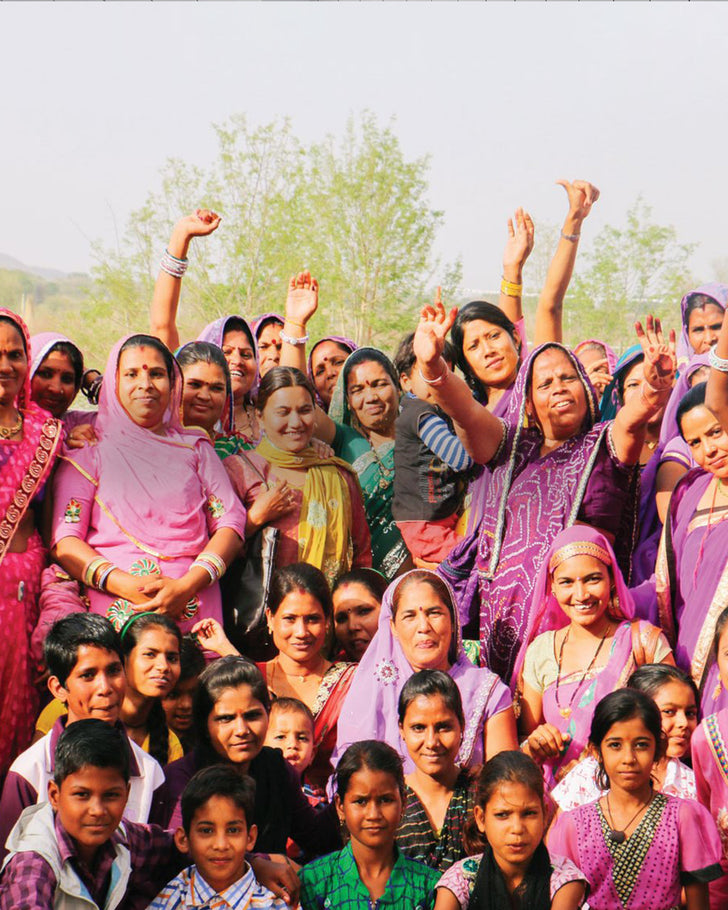The ANCHAL Impact

ANCHAL /ON-CHAL/ NOUN
THE DECORATIVE EDGE OF A SARI USED TO PROVIDE COMFORT & PROTECTION TO LOVED ONES - OR SHELTER
With backgrounds in design, sisters Colleen and Maggie Clines lead the brand by placing design at the center of Anchal’s everyday practice. Colleen earned her Master of Landscape Architecture degree from the Rhode Island School of Design (RISD) in 2010. During Colleen’s time in graduate school, she was inspired to start Anchal with three classmates after traveling to India and learning about the extreme oppression women faced as commercial sex workers and the economic opportunity presented by the region's rich textiles.
“We felt compelled to take the project beyond the classroom with the conviction that our design training in collaboration with local leadership could address seemingly intractable social and environmental systems. The women we met became our sisters, sisters we had to fight for.” - Colleen Clines, Co-Founder & CEO
IMPACT
Anchal is changing lives and YOU are part of the solution. The impact is unmistakable when the artisans share their brave stories of empowerment and the collective quantitative growth.
Anchal’s program proves that when we systematically address women’s inequality with holistic employment and education opportunities, we can instigate women, families and entire communities to lead healthy, financially independent lives.
“We can spend more money on our families now. Whether we want to send our kids to private school, invest in property or buy groceries - we can do it. We can do anything now.” - Anita
We are committed to ensuring our program is creating positive change by conducting annual social impact assessments. We measure true empowerment and the success of our model through 5 different facets – economic, intellectual, physical and emotional health, confidence and community – and their corresponding indicators of growth.
ECONOMIC
- Artisans earn 25% - 100% more by working with Anchal.
- 70% now control the financial income & are considered the primary breadwinner of the family.
“My husband tries to tell me that I can’t go to work. But I make the money now. So I say no, I have to work. It’s my money & it’s my future.” – Narayani
INVESTMENT
- 88% have made home improvements. (new homes, new additions/expansions, investments in furniture, new refrigerators, and water filters.)
- 65% purchased their first homes.
EDUCATION
“I liked the education workshops in communication. It helped me improve my life in every dimension.” – Durga
“My sister borrows used books from the school and gives them to me. When my husband and my children are sleeping, I study. I will pass 11th class this year & 12th class next year. I didn’t know I could do that before.” – Mamta
EMPOWERMENT/COMMUNITY
The artisans choose to gather daily at the office; working, singing, laughing, crying and sharing their stories. Realizing that they shared the same painful pasts, friendships and support systems quickly develop between women who would otherwise consider each other competitors.
“Look at the difference we can make together. We’re doing it.” – Shama
“I have taught them to be hopeful. They have taught me to be hopeful. We can do it. We are in it together.” – Durga
BREAKING THE CYCLE
A woman who has more money supports her entire family and breaks the cycle of subjugation and poverty that could otherwise drive her daughters into the sex trade.
- 100% of artisans are investing in their children’s education.
HEALTH
- 98% are able to afford healthy food options.
- 76% of artisan's children receive an annual health checkup.
- 90% can now afford health care for themselves & their families.
The success of our program is most tangible in the stories of our artisans. Meet Kamla, Nazia & Seema.

Kamla was born into extreme poverty and never went to school. She did labor work from the time she was only a 13-year-old girl until she was old enough to have an arranged marriage. She married and had her first daughter at age 18. Today she is a 53 year-old-woman with 4 daughters ages 10-35. Kamla was determined to give her daughters the opportunities that she never had, but struggled to find safe, reliable work.
Today, Kamla has been working with Anchal for five years. She has worked very hard, consistently creating beautiful, marketable pieces. She takes advantage of the education workshops in subjects such as financial planning & goal setting and recently saved enough money to purchase a home of her own. Her youngest daughter, who recently taught Kamla how to sign her name, is in 3rd grade. Two of her daughters are in high school & the oldest one is in graduate school, studying to become a teacher herself.
“5 years ago I didn't think I could be here. But I am here. And I am happy now.” - Kamla
Kamla's daughter's lives are not only economically improved, they are enriched by the prospect of higher education and empowered by possibilities. Kamla is a shining example of what ambition & determination can accomplish.
In our most recent trip to India, we visited Kamla's new home in Ajmer. As we were walking up to the entrance she said, "I just want to make my daughters proud."
Seconds later her daughters greeted us & embraced her with loving hugs. In that moment we had no doubt that she had already succeeded. Kamla's daughters are young, fearless agents of change, not only because of their education, but because of the example that their mother set.

In a 2012 trip to India, we asked several of the artisans enrolled in our program what differences Anchal has allowed them to make in their lives. When we asked Nazia, a twenty-year-old woman with a six-year-old son who was abandoned by her husband and struggling to support both her son and sick mother, she responded both simply & frankly: she could now buy fruit for her son.
Prior to Anchal, fruit was an unaffordable luxury. Nazia would carefully navigate around the fruit aisle at the local market so that her son wouldn’t be tempted by what she couldn’t give him. Hearing Nazia’s tale was a raw, honest, and above all, humbling moment. Our prior perceptions on change were contingent solely on materialistic, economic changes in the lives of women. What Nazia’s sense of accomplishment taught us, is that the change in day-to-day life can encompass the difference in perception of what constitutes poverty. Sometimes the seemingly smallest changes reveal the biggest impact.
In our 2015 trip to India, we sat down with Nazia again, who has since become a project assistant, and asked her the same question. She now pays for her son’s education and a private tutor 2 times weekly. She sits in on the lessons & learns alongside him so that she can answer any questions that he may need help with. Her dream is to facilitate the environment & provide him with the opportunities he needs to fulfill his own dreams.
“We work really hard to make stuff that people like. When people buy our products it means that we can clothe, feed & educate our children.” - Nazia
To witness Nazia, who once struggled to provide food – the most basic need – support her son’s private education & elevate her family from entrenched poverty is the heart of what our program is about.

On the first day of the 2015 design workshops we loved watching the artisans file into the office one-by-one & joyously embrace each other. Most of them have small children and choose to work from home, so they don’t see each other regularly. They greeted each other with huge smiles and warm hugs. Their children instantly resumed old friendships and ran around giggling and playing hide & seek. The reunion was a joyous moment.
On the second day we noticed that Seema, who had brought both her son & daughter the day before, had come to the workshops alone. I figured that her children must have stayed at home with their father and I didn’t think twice about it. After a long morning we took a break for chai. The artisans sat together on the rooftop laughing and catching up until they were interrupted by Seema’a children, who ran toward them with huge smiles. This time they had on matching school uniforms and larger-than-life backpacks. Of course, they were at school.
“We have something to be proud of now. To leave the house, work, earn, and set an example for our children--it's everything.” - Seema
Seema is not alone. In fact, 100% of the artisan’s children are currently enrolled in school. This is not a coincidence – it’s an accomplishment that can’t be undermined. Over 40% of Anchal artisans didn’t go to school themselves and can’t read or write today. Of the 55% that did attend school, 65% dropped out before grade 7 and only 1% completed high school. Before Anchal, chances were that their children would follow the same pattern just as they had followed their own parents.
Anchal artisans are refusing to let that happen. They are determined to give their children the opportunities that they were deprived of, and so they are making education a priority. By investing in education, Anchal artisans are systematically ending the once inevitable cycle of intergenerational prostitution. They are putting an end to the stigma and entrenched poverty that their families have faced for centuries.

